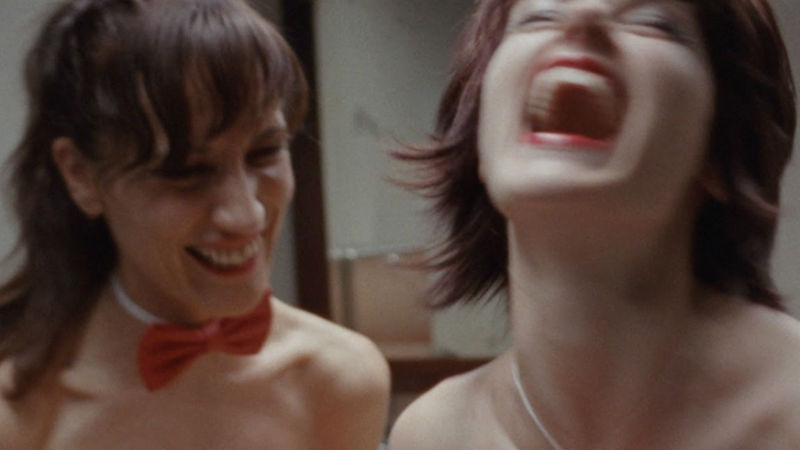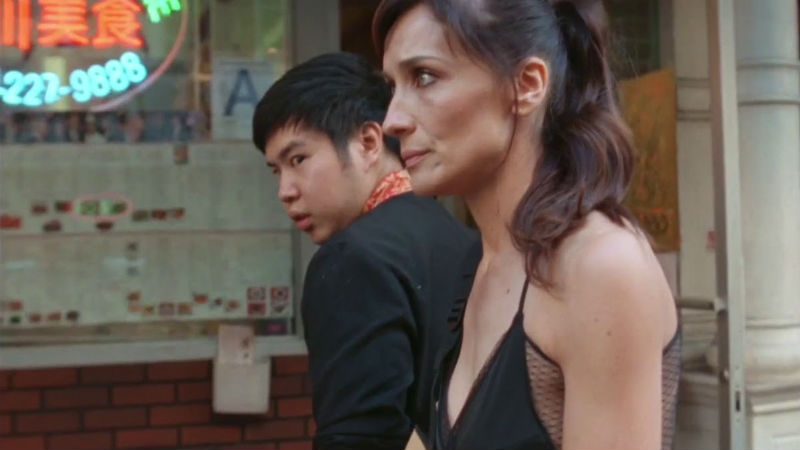The Quebecois Babysitter starts at full gallop and never goes down to a trot throughout its entire 90 minute runtime. It begins with men delivering dialogue out their mouths like they’re firing semi-automatics, annoying women in front of them by asking them inappropriate questions. They’re drinking, shouting, almost screaming, the camera cutting between them in a chaotic, oppressive fashion, cinematographer Josée Deshaies favouring intense close-ups and avoiding wide shots. They’re at an MMA match, which is bloody, two men on the floor almost killing each other. We’ve been airdropped in the land of toxic masculinity. No one will get out unscathed.
Cédric (Patrick Hivon) is living in the land of misogyny, so he doesn’t think it’s a big deal to harass a TV reporter outside the match with a hug and a kiss. But he lands in hot water straight away; suspended from his job, he has to do some soul-searching, 8 1/2-style (Federico Fellini, 1963), taking us on a surreal, overwhelming and frantic comedy that I found more irritating than thought-provoking.
It’s clear that Cédric is not a monster, but he’s definitely an asshole. The question you might ask yourself is: where does the asshole end and the monster begin? It’s worthwhile for all men, and women too, to do the necessary work to see how they might be misogynists, overt or otherwise. In a clever bit of plot-development, Cédric decides to write a letter to the aggrieved TV reporter, which he later develops into a narcissistic memoir. Masculinity is toxic, but its also a hot, marketable topic. Everyone loses under capitalism.
Meanwhile, Sonia Chokri, also directing, stars as his wife, refusing to fit into any conventional category of oppressed womanhood. Nonetheless, she is also taken on a journey of confused identity when the titular babysitter Amy (Nadia Tereszkiewicz), appears, tasked to help the two exhausted parents take care of a baby that simply doesn’t sleep.
22, big hair, and cleavage always on show, she is a parody of flush, young and readily available sexuality, provoking Cédric and his journalist brother while also defying conventional stereotypes of women as mere victims. Tereszkiewicz plays the part particularly well, imbuing porno clichés with uncertain menace.
It’s ripe for a clever and biting farce, but the overbearing atmosphere, replete with chaotic sound design and rapid cutting, makes for an experience as intrusive and as unwarranted as Cédric’s drunken advances. This is an all-woman show, with Chokri working alongside playwright Catherine Léger to make fun of both men and women alike. But the final result is all over-the-place, unable to corral the material into the deconstruction of masculinity the premise deserves.
I guess the #metoo movement and the surrounding debate over male norms is due a good satire. But they need to be a lot sharper and funnier than this. Babysitter starts with a clever enough idea and boasts a fresh enough style, but the movie never does enough in the first place to actually make this a satire worth sitting through. Don’t book a babysitter to go see this one.
Babysitter plays in Competition at TIFF, running from 17th-26th June.










